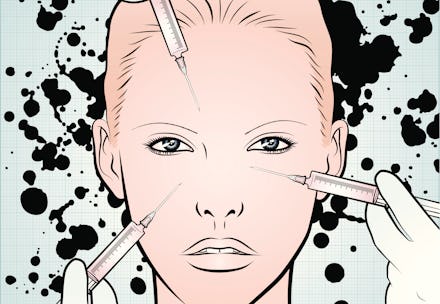Botox could help treat depression, new study suggests

Depending on where you live, the stigma that comes with Botox varies, but I personally love it. I ostensibly started getting injections in my forehead to ease tension headaches, but even though it didn’t alleviate them completely, I saw how smooth my forehead looked in pictures for months afterwards and was hooked. When my non-conformist anticapitalist friends questioned the expense of my vanity I always told them that getting Botox made me feel happy. I may have been on to something, because a new study suggests that Botox injections may ease depression.
Most folx use it to smooth wrinkles, but Botox is also approved by the Food and Drug Administration (FDA) to treat migraines, excessive sweating, lazy eye, and neck spasms. This is because it’s made from a toxin produced by the bacterium Clostridium botulinum – a.k.a. botulism – which weakens or paralyzes muscles and blocks certain nerves in order to ease tension or spasms. To be clear on the term “toxin” in this context, the active ingredient in Botox can be dangerous, but the amount of it in Botox is much smaller than what is considered harmful and it is diluted in saline.
Researchers have suspected that Botox may have some benefit for people with depression for a while, but the hypothesis was that Botox could disrupt a feedback loop between muscles in the forehead and brow region – which are associated with grief – and negative emotions, CNN reported. In kindergarten terms, doctors have believed, for a while now, that Botox may help depression by easing the tension of some of our grief muscles.
This new study, released this morning in the journal Scientific Reports suggests that while there may indeed be a connection between the feedback loop theory, it may not matter where patients get Botox injections in order for them to be effective. "We found that (the effect) doesn't depend on the location of the injection," Ruben Abagyan, the lead author of the study and a professor in the Skaggs School of Pharmacy and Pharmaceutical Sciences at the University of California, San Diego, told CNN.
It also doesn’t seem to matter why patients were getting Botox. The study analyzed the effect Botox had on over 40,000 people who got the injections for various reasons. The data was collected from patients who had had negative side effects from the medication, and researchers weren’t even specifically looking for a connection between Botox and depression, but what they found was that participants who got Botox to treat everything from sweating to spasms reported depression 40% to 88% less frequently than people who did not. Importantly, the study did not include any people who were already taking medications for depression.
Researchers aren’t totally sure why Botox may help depression, but researchers have an idea that it may be related to the original theory that Botox smooths the grief muscles. Their hypothesis is that Botox may remove some of the muscle tension that people with depression often report, not just in their foreheads, but all over their bodies, CNN reported. In other words, if Botox can interrupt the feedback loop between muscle tension and negative emotions, it may not matter where the injection is, because the small amounts of Botox enter the bloodstream when you get an injection circulate throughout the body.
"Imagine that when you get depressed, all the muscles get stressed and constricted," Abagyan told CNN. That tension creates a muscle memory, Abagyan explained, that is associated with negative emotions, like feelings of depression. Botox may interrupt that connection by removing the muscle tension associated with those bad feelings. "By breaking that memory by basically relaxing all of them, you break the feedback," he told CNN.